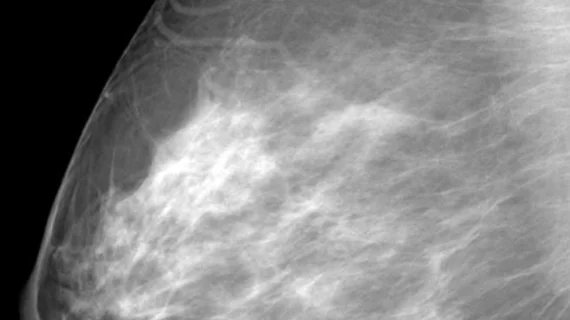Many providers remain underinformed about increased cancer risks associated with breast density
Despite women with dense breast tissue facing a “double whammy” when it comes to their breast cancer risks, both patients and providers remain underinformed about best practices regarding how to appropriately manage screenings in the presence of increased density.
JoAnn Pushkin, breast cancer survivor and executive director of DenseBreast-info.org, sounded the alarm on the lack of awareness surrounding breast density and its associated cancer risks during a presentation at this year’s annual RSNA meeting.
During the session, Pushkin shared her own experience with having her breast cancer overlooked due to the masking effect of dense breast tissue, in addition to presenting data from two published studies from DenseBreast-Info.org (DB-I) indicating that there is a general lack of awareness surrounding the risk of increased density among not just patients, but providers and techs as well.
The data presented highlighted troubling knowledge gaps pertaining to breast density categories, their associated risks and the most appropriate screening methods for women deemed to have above average breast density.
Prior to an educational intervention detailing all of the aforementioned, nearly 1/3 of physicians and technologists involved in the research overestimated the ability of digital breast tomosynthesis for detecting cancer in dense breasts as nearly equal to breast MRI. The same amount was also found to be misinformed about the appropriate risk models that should be utilized when recommending further testing, such as breast MRI or genetic testing.
Prior to the intervention, just over half of techs and providers understood that women with extremely dense breasts have a four-to-six-fold greater risk of developing breast cancer in comparison to those with fatty breasts. Following the intervention, this figure improved to 97%. Similarly, just 29% of respondents knew that breast cancer risk rises as tissue density increases; that figure increased to 63% following the educational intervention.
The pre- and post-test results indicate that educational outreach can improve knowledge relative to breast density status and its associated risks, Pushkin suggested.
But not all states require providers to notify patients of their density status, knowledge gaps remain. This is something that Pushkin has pled with Congress to change.
Since recovering from breast cancer, Pushkin has become a staunch advocate for laws requiring providers to notify patients of the status of their breast density. She has worked to push the FDA to introduce and implement a single nationwide breast density reporting standard and is currently working with Congresswoman Rosa DeLauro lending her support in development of a federal law that would require insurance providers to offer no-cost coverage of breast cancer screening, supplementary or otherwise, for all women.
To learn more about the risks associated with increased breast density, or to access tools to help guide screening recommendations, visit densebreast-Info.org.

